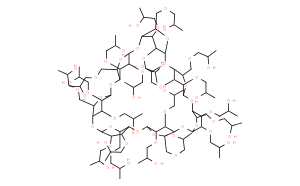 ( 母液浓度为 40 mg/mL ), 如您需要配置的浓度超过该产品的溶解度,请先与我们客服联系。
( 母液浓度为 40 mg/mL ), 如您需要配置的浓度超过该产品的溶解度,请先与我们客服联系。| 中文名称: | (2-羟丙基)-β-环糊精 一键复制产品信息 | ||||
|---|---|---|---|---|---|
| 英文名称: | (2-Hydroxypropyl)-β-cyclodextrin | ||||
| 别名: | 羟丙基-β-环糊精 (2-Hydroxypropyl)-β-cyclodextrin | ||||
| CAS No: | 128446-35-5 | 分子式: | C63H112O42 | 分子量: | 1541.54 |
| CAS No: | 128446-35-5 | ||||
| 分子式: | C63H112O42 | ||||
| 分子量: | 1541.54 | ||||
| MDL: | MFCD00074978 | ||||
本计算器可帮助您计算出特定溶液中溶质的质量、溶液浓度和体积之间的关系,公式为:
质量 (g) = 浓度 (mol/L) x 体积 (L) x 分子量 (g/mol)
摩尔浓度计算公式
用本工具协助配置特定浓度的溶液,使用的计算公式为:
开始浓度 x 开始体积 = 最终浓度 x 最终体积
稀释公式
稀释公式一般简略地表示为:C1V1 = C2V2 ( 输入 输出 )
(2).jpg)
 母液,添加 300 μLPEG300
母液,添加 300 μLPEG300 混匀澄清,再加 50μLTween80, 混匀澄清,再加 600μLSaline/PBS/ddH2O
混匀澄清,再加 50μLTween80, 混匀澄清,再加 600μLSaline/PBS/ddH2O 混匀澄清
混匀澄清方案所需的各种助溶剂如: DMSO , PEG300 / PEG400 , Tween 80 , SBE-β-CD , 玉米油 等, 均可点击跳转或在网站搜索购买。
计算结果:
工作液浓度: mg/ml;
DMSO母液配制方法: mg 药物溶于 μL DMSO溶液(母液浓度 mg/mL,
体内配方配制方法:取 μL DMSO母液,加入 μL PEG300,混匀澄清后加入μL Tween 80,混匀澄清后加入 μL Saline/PBS/ddH2O,混匀澄清。
1. 首先保证母液是澄清的;
2.
一定要按照顺序依次将溶剂加入,进行下一步操作之前必须保证上一步操作得到的是澄清的溶液,可采用涡旋、超声或水浴加热等物理方法助溶。




.png)





